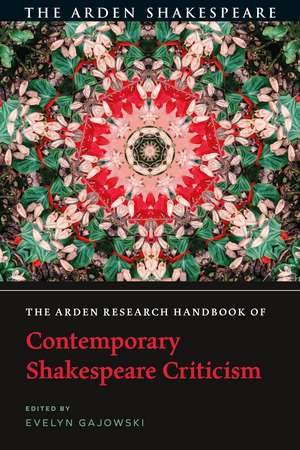The Arden Research Handbook of Contemporary Shakespeare Criticism: The Arden Shakespeare Handbooks
Editat de Dr Evelyn Gajowskien Limba Engleză Paperback – 13 iul 2022
| Toate formatele și edițiile | Preț | Express |
|---|---|---|
| Paperback (1) | 185.43 lei 6-8 săpt. | |
| Bloomsbury Publishing – 13 iul 2022 | 185.43 lei 6-8 săpt. | |
| Hardback (1) | 773.23 lei 6-8 săpt. | |
| Bloomsbury Publishing – 14 oct 2020 | 773.23 lei 6-8 săpt. |
Preț: 185.43 lei
Preț vechi: 324.60 lei
-43% Nou
Puncte Express: 278
Preț estimativ în valută:
35.48€ • 37.05$ • 29.37£
35.48€ • 37.05$ • 29.37£
Carte tipărită la comandă
Livrare economică 04-18 aprilie
Preluare comenzi: 021 569.72.76
Specificații
ISBN-13: 9781350327504
ISBN-10: 1350327506
Pagini: 392
Dimensiuni: 156 x 234 x 25 mm
Greutate: 0.54 kg
Editura: Bloomsbury Publishing
Colecția The Arden Shakespeare
Seria The Arden Shakespeare Handbooks
Locul publicării:London, United Kingdom
ISBN-10: 1350327506
Pagini: 392
Dimensiuni: 156 x 234 x 25 mm
Greutate: 0.54 kg
Editura: Bloomsbury Publishing
Colecția The Arden Shakespeare
Seria The Arden Shakespeare Handbooks
Locul publicării:London, United Kingdom
Caracteristici
It defines, explains, and analyzes over 20 specific contemporary critical practices in concrete detail and points out possible pathways for future work
Notă biografică
Evelyn Gajowski is Barrick Distinguished Scholar and Professor of English Emerita at the University of Nevada, Las Vegas, USA. She has published four books: The Merry Wives of Windsor: New Critical Essays, with Phyllis Rackin (2015); Presentism, Gender, and Sexuality in Shakespeare (2009); Re-Visions of Shakespeare: Essays in Honor of Robert Ornstein (2004); and The Art of Loving: Female Subjectivity and Male Discursive Traditions in Shakespeare's Tragedies (1992). She serves as Series Editor of the Arden Shakespeare and Theory Series.
Cuprins
List of Illustrations and TablesNotes on ContributorsSeries PrefaceAcknowledgementsList of Abbreviations1.0 Introduction: Twenty-first-century Shakespeares, Evelyn Gajowski (University of Nevada, Las Vegas, USA)PART ONE: Foundational Studies1.1 Close Reading, Kent Cartwright (University of Maryland, College Park, USA)1.2 Genre Studies, Michelle Dowd (University of Alabama, USA)1.3 Character Studies, Michael Bristol (McGill University, Canada)PART TWO: Challenges to Traditional Liberal Humanism2.1 Marxist Studies, Christian Smith (Kingston University, UK)2.2 New Historicist Studies, Hugh Grady (Arcadia University, USA)2.3 Cultural Materialist Studies, Christopher Marlow (University of Lincoln, UK)2.4 Feminist Studies, Jessica McCall (Delaware Valley University, USA)2.5 Psychoanalytic Studies, Carolyn E. Brown (University of San Francisco, USA)PART 3: Matters of Difference3.1 Critical Race Studies, Arthur L. Little, Jr. (UCLA, USA)3.2 Postcolonial Studies, Ruben Espinosa (University of Texas, El Paso, USA)3.3 Queer Studies, Anthony Guy Patricia (Concord University, USA)PART 4: Millennial Directions4.1 Ecocritical Studies, Randall Martin (University of New Brunswick, Canada)4.2 Computational Studies, Brett Greatley-Hirsch (University of Leeds, UK)4.3 Spiritual Studies, Peter Atkinson (Worcester Cathedral, UK)4.4 Presentist Studies, Miguel Ramalhete Gomes (University of Lisbon, Portugal)4.5 Global Studies, Alexa Alice Joubin (George Washington University, USA)PART 5: Twenty-first-century Directions5.1 Disability Studies, Katherine Schaap Williams (NYU Abu Dhabi)5.2 Ecofeminist Studies, Jennifer Munroe (University of North Carolina, Charlotte, USA) and Rebecca Laroche (University of Colorado, Colorado Springs, USA)5.3 Posthumanist Studies, Karen Raber (University of Mississippi, USA)5.4 Cognitive Ethology Studies, Craig Dionne (Eastern Michigan University, USA)Appendices, Gary Lindeburg, Evelyn Gajowski, and Dorothy Vanderford (University of Nevada, Las Vegas, USA)Timeline of Significant DevelopmentsA-Z Glossary of Key TermsAnnotated BibliographyResources for Further ResearchIndex
Recenzii
A vital collection for anyone who is studying Shakespeare. This handbook deftly covers the critical lenses that have been applied to Shakespeare's works in the past and provides a window into what is to come.
One of the strengths of this book is its scholarly comprehensiveness, which alone will render it indispensable for future researchers and committed students. Another is its lucidity and accessibility. Yet even more significant is the way it situates Shakespeare in relation to the most fertile and exciting intellectual moment the university humanities have ever seen, and the likes of which we might not see again, given what's happening to higher education in the West.
What this collection does do is open up possibilities of thinking differently and learning from others. The book is structured in a roughly chronological order, each chapter is useful in not only providing a history of each form of study but also clarifies important terms and offers a good bibliography for further study. Moreover, there are helpful appendices with a glossary and annotated bibliography ... In conclusion, this is an indispensable help for all critics, young and old.
One of the strengths of this book is its scholarly comprehensiveness, which alone will render it indispensable for future researchers and committed students. Another is its lucidity and accessibility. Yet even more significant is the way it situates Shakespeare in relation to the most fertile and exciting intellectual moment the university humanities have ever seen, and the likes of which we might not see again, given what's happening to higher education in the West.
What this collection does do is open up possibilities of thinking differently and learning from others. The book is structured in a roughly chronological order, each chapter is useful in not only providing a history of each form of study but also clarifies important terms and offers a good bibliography for further study. Moreover, there are helpful appendices with a glossary and annotated bibliography ... In conclusion, this is an indispensable help for all critics, young and old.





